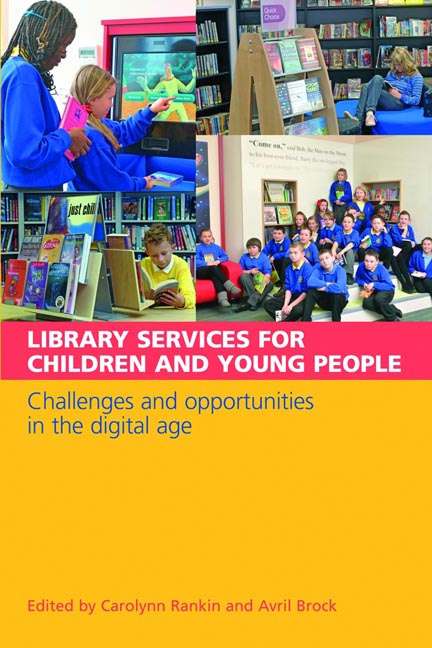Book contents
- Frontmatter
- Dedication
- Contents
- Contributors
- Foreword
- Acknowledgements
- Introduction and vision for the book
- Part 1 Children's library services – policy, people and partnerships
- 1 Library services for children and young people – an overview of current provision, future trends and challenges
- 2 21st-century school libraries – visionary spaces for learning
- 3 The changing shape of reading – the 21st-century challenge
- 4 Case study. Engaging and influencing policy and the curriculum – the Scottish Information Literacy Project experience
- Part 2 Connecting and engaging – reaching your audience and catching the latest wave
- Part 3 Buildings, design and spaces – libraries for children and young people
- Part 4 Issues for professional practice
- Index
3 - The changing shape of reading – the 21st-century challenge
from Part 1 - Children's library services – policy, people and partnerships
Published online by Cambridge University Press: 08 June 2018
- Frontmatter
- Dedication
- Contents
- Contributors
- Foreword
- Acknowledgements
- Introduction and vision for the book
- Part 1 Children's library services – policy, people and partnerships
- 1 Library services for children and young people – an overview of current provision, future trends and challenges
- 2 21st-century school libraries – visionary spaces for learning
- 3 The changing shape of reading – the 21st-century challenge
- 4 Case study. Engaging and influencing policy and the curriculum – the Scottish Information Literacy Project experience
- Part 2 Connecting and engaging – reaching your audience and catching the latest wave
- Part 3 Buildings, design and spaces – libraries for children and young people
- Part 4 Issues for professional practice
- Index
Summary
Introduction
Experience will have shown the readers of this book that a highly literate child is not necessarily a reading child and, similarly, that not every child with reading difficulties will dislike reading. Our work – to develop literacy and to encourage reading – has changed in recent years, in part owing to developments in the educational curricula, and in part rapidly changing technologies. This chapter presents six themes through which to consider the challenges facing libraries and the book trade as a whole, making suggestions as to how both public and school libraries can meet them head on.
Reading, the family and the library
Recently, reading research has broadened in scope to consider the way in which social contexts influence reading ability. It is now widely accepted that the development of reading skills occurs not only in the classroom, but also within social settings, at home and in the wider community. Children and family members combine languages, literacies and cultural practices from a variety of contexts. In many examples grounded in ‘real world settings’, in other words, beyond the school gates, children's learning and their development as readers are supported and, in turn, support those of others, in ways that are not necessarily recognized or understood within the school curriculum (Olmedo, 2004).
The most obvious example of a child or young person's ‘real world setting’ is the family. The phrase ‘family reading’ tends to be interpreted in two ways: first, as family members supporting each other in the development of their literacy skills, and, second, as family members sharing their enjoyment of reading and storytelling.
Unfortunately, a number of barriers have been found to prevent effective family reading. These barriers are described below:
Lack of early language and reading experiences: where children are not encouraged to talk and take part in extended conversations with those they spend their time with, their understanding of the spoken and written word is poorer than that of their peers.
Intergenerational barriers: where parents have not enjoyed reading, or were not read to themselves, they do not necessarily understand its importance. Reading is, consequently, seen as a chore.
Poor basic skills: where parents’ own basic skills are low, they are less confident and less able to support their children's reading.
- Type
- Chapter
- Information
- Library Services for Children and Young PeopleChallenges and opportunities in the digital age, pp. 39 - 48Publisher: FacetPrint publication year: 2012



